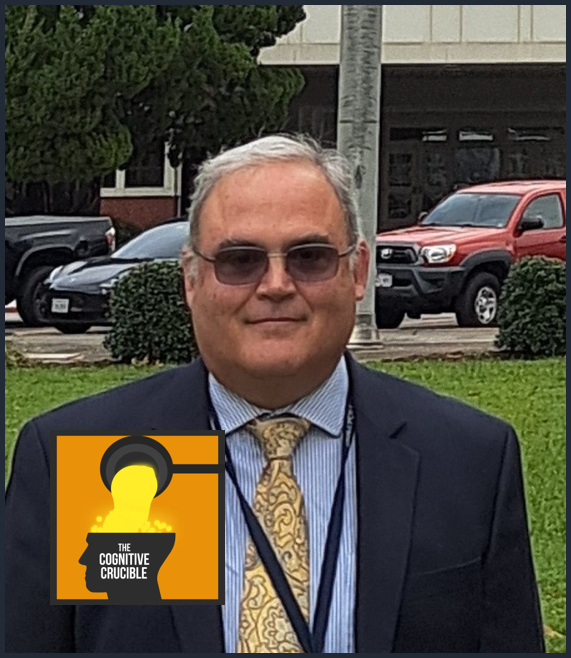
The Cognitive Crucible is a forum that presents different perspectives and emerging thought leadership related to the information environment. The opinions expressed by guests are their own, and do not necessarily reflect the views of or endorsement by the Information Professionals Association.
During this episode, Ed Hollandsworth of the Joint Forces Staff College shares his observations related to career-level US military officer education and the recently released joint doctrine: JP 3-04 Information in Joint Operations.
Research Question: Ed suggests that researchers consider a cluster of inter-related questions that could be considered as a research agenda. This means each question by itself could be the focus of a separate research effort. Building on the podcasts of Major Cassandra Brooker (#81) and John DeRosa and Alex DelCastillo (#82), Ed challenges scholars to ask “How can the US Government validly, accurately, and rapidly measure the effectiveness of its operations in the information environment in time to influence leader decisions about future plans and operations? What social science methods and performance measurement models are well-suited to this complex task? How should the Intelligence Community posture itself to support OIE performance measurement? Downstream, what are the implications of integrated OIE strategies, and the measurement of their effectiveness, for future changes in intelligence collection, predictive analysis, and training and education curriculum development?”
Resources:
Link to full show notes and resources
https://information-professionals.org/episode/cognitive-crucible-episode-126
Guest Bio:
Dr. Edgar “Ed” Hollandsworth reported to the Joint Forces Staff College in September of 2021 as the DIA Academic Chair, a 3-year rotational assignment. In September 2022, National Defense University appointed him as an Assistant Professor. He teaches lessons on intelligence studies, information warfare, space and cyberspace operations, and national defense organization in all three JFSC colleges.
Ed joined DIA in 2007. His positions included Director of National Intelligence Pat Roberts Intelligence Scholar, 2020-2021; Deputy Career Field Manager and Lead Career Development Officer, Mission Management (MM) Career Field, Joint Staff J2M (MM Workforce Development Division), 2015-2020; Deputy Chief, Mission Integration Division, National Measurement and Signature Intelligence Office (NMO), Directorate for Science and Technology (ST), 2014-2015; Chief, Enterprise Integration Division, DoD Special Communications Enterprise Office, ST, 2012-2014; Space Policy Analyst, Office of the Deputy Assistant Secretary of Defense for Space Policy, 2011-2012; Chief, Functional Management Division, Office for Collection Management Enterprise, Defense Intelligence Operations Coordination Center (DIOCC), 2009-2010; Senior Intelligence Officer (Policy and Strategy) and Acting Chief, Policy and Strategy Division, DIOCC, 2007-2009.
Prior to his DIA career, Ed served for 20 years as an Air Force intelligence officer, retiring in 2006 as a Lieutenant Colonel. His Air Force assignments included Assistant Director of Operations, Air Force Technical Applications Center, 2004-2006; Assistant Air Attaché to Germany, DIA, 2001-2004; Intelligence Requirements Certification Officer, Joint Staff J2P, 1999-2001; Joint Warfighting Capabilities Assessment Studies Lead, Joint Staff J2P, 1997-1999; Chief, Multi-Force Assessment Division, Chief, Joint Analysis and Reporting Division, and Section Chief, Misawa Cryptologic Operations Center, Air Intelligence Agency, 1994-1997; Chief, National Systems Collection Management, OPERATION PROVIDE COMFORT C2, 1996; Assistant Professor of Aerospace Studies, Air Force ROTC Det. 520, Cornell University, 1991-1994; Arms Control Analyst, Soviet Politico-Military Affairs Officer and Watch Officer, Headquarters Air Force Intelligence Agency, 1988-1991; Student, Naval Postgraduate School National Security Affairs program, Air Force Institute of Technology, 1986-1987. He also served as a desk editor for the Foreign Broadcast Information Service and as a security escort at the Central Intelligence Agency, 1984-1986.
Ed is a graduate of the Defense Senior Leader Development Program, 2012; Army War College, 2011; Armed Forces Staff College, 2000; Air Command and Staff College, 1998; and Air Force Academic Instructor School, 1991. He holds a B.S. in Foreign Service majoring in International Politics from Georgetown University, a masters in East European Area Studies from the Naval Postgraduate School, an MBA from the University of Colorado at Colorado Springs, a masters in strategic studies from the Army War College, and a Ph.D. in Public Administration/Public Affairs from Virginia Tech. Ed co-taught Cornell University and Ithaca College undergraduates as an Air Force ROTC instructor; adult undergraduates in business administration at Columbia College, Patrick Air Force Base, as an adjunct faculty member; and graduate students in the Joint Forces Staff College as a full-time faculty member. His research interests include government reform, public management theory and practice, intelligence studies, and challenges of governing the global commons.
About: The Information Professionals Association (IPA) is a non-profit organization dedicated to exploring the role of information activities, such as influence and cognitive security, within the national security sector and helping to bridge the divide between operations and research. Its goal is to increase interdisciplinary collaboration between scholars and practitioners and policymakers with an interest in this domain.
For more information, please contact us at communications@information-professionals.org.
Or, connect directly with The Cognitive Crucible podcast host, John Bicknell, on LinkedIn.
Disclosure: As an Amazon Associate, 1) IPA earns from qualifying purchases, 2) IPA gets commissions for purchases made through links in this post.